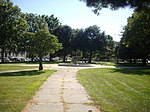Thompson Block
1867 establishments in MaineCommercial buildings completed in 1868Commercial buildings in Portland, MaineCommercial buildings on the National Register of Historic Places in MaineHistoric district contributing properties in Maine ... and 4 more
NRHP infobox with nocatNational Register of Historic Places in Portland, MaineOld Port of Portland, MaineUse mdy dates from August 2023

The Thompson Block is a historic commercial building located at 117, 119, 121, 123 and 125 Middle Street in downtown Portland, Maine. It was designed by architect George M. Harding and constructed in 1867. Along with the neighboring Rackleff and Woodman Buildings (also Harding designs), it forms one of the best-preserved period commercial street views in the entire state. The building was added to the National Register of Historic Places on February 28, 1973.
Excerpt from the Wikipedia article Thompson Block (License: CC BY-SA 3.0, Authors, Images).Thompson Block
Middle Street, Portland
Geographical coordinates (GPS) Address Nearby Places Show on map
Geographical coordinates (GPS)
| Latitude | Longitude |
|---|---|
| N 43.658888888889 ° | E -70.253055555556 ° |
Address
Middle Street 121
04101 Portland
Maine, United States
Open on Google Maps











